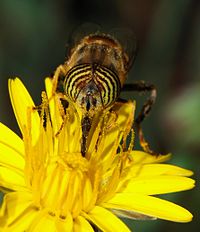
Photo from wikipedia
Abiotic environmental factors are predicted to affect plant traits and the intensity of plant-pollinator interactions. However, knowledge of their potential effects on pollinator-mediated selection on floral traits is still limited.… Click to show full abstract
Abiotic environmental factors are predicted to affect plant traits and the intensity of plant-pollinator interactions. However, knowledge of their potential effects on pollinator-mediated selection on floral traits is still limited. We separately estimated the effects of soil water (two sites with different soil water contents) and N-P-K nutrient availability (different levels of nutrient addition) on pollinator-mediated selection on floral traits of Primula tibetica (an insect-pollinated perennial herbaceous species). Our results demonstrated that floral traits, plant reproductive success and pollinator-mediated selection on floral traits varied between sites with different soil water contents and among different levels of nutrient addition. The strength of pollinator-mediated selection was stronger at the site with low soil water content than at the site with high soil water content, and first decreased and then increased with increasing N-P-K nutrient addition. Our results support the hypothesis that abiotic environmental factors influence the importance of pollinators in shaping floral evolution.
Journal Title: Frontiers in Plant Science
Year Published: 2022
Link to full text (if available)
Share on Social Media: Sign Up to like & get
recommendations!